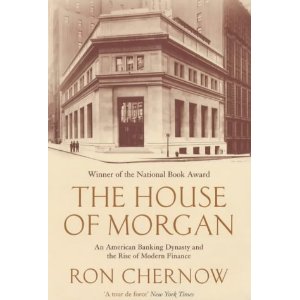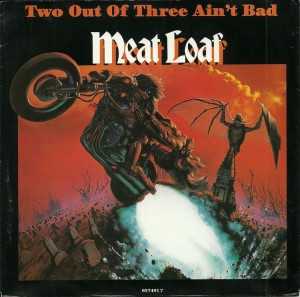Since the beginning of the Great Recession, JP Morgan’s Jamie Dimon has played the role of the United States’ Alpha Banker: snatching Bear Stearns’ franchise at bargain basement prices, modeling superior risk management,[1] and publically pushing back against government regulation of his industry, all the while acting as Obama’s BFF when it suits him.
So it takes a great book like The House of Morgan to see Dimon’s Mini-me status compared to the original John Pierpont Morgan. In sweep of history, stretching from the original J. P. Morgan to Jamie Dimon, the former looms like the Atlas statue outside of Rockefeller Center over Dimon’s diminuitive Oscar statuette.
Size matters in this story. Even in paperback form, The House of Morgan arrives bigger than a breadbox. And Ron Chernow can write big. The one-hundred-year epic sweep of the bank’s rise and evolution tracks the United States’ rise as the world financial center, a position wrestled from the Brits in the first half of the 20th Century.
J.P. Morgan himself, a giant of a man with his 19th Century prejudices and a horrifyingly bulbous, pockmarked nose, shaped the entire world through force of will and unerring capital deployment. In contrast to today’s mega-banks, saved from the brink by massive government intervention, the House of Morgan intervened to prevent government collapse. In 1907, one hundred years before our own 2008 Credit Crunch, Morgan single-handedly engineered a market-saving trust merger.
Here are a few more essential reasons to read The House of Morgan.
First, if you work on Wall Street and don’t understand the original deep divide between Jewish and Gentile banking worlds, start here. JP Morgan, the ultimate white-shoe firm[2], fought bitterly and ultimately unsuccessfully to keep the likes of Kuhn, Loeb; Lehman Brothers; and Goldman, Sachs from competing on equal footing for banking assignments.
In the latter half of the 20th Century, cozy relationship banking gave way to a competitive world that required top intellectual talent and drive. Morgan and its (predominantly) Protestant brethren often chose family pedigree over talent, a choice that put them at a disadvantage when sons didn’t exhibit the same drive as their fathers. The traditional Jewish Wall Street firms, by contrast, tended to welcome a variety of backgrounds into their ranks, based on intellectual and personal qualities, rather than limiting their employees to those of Jewish heritage. By the 1980s, Goldman Sachs, Salomon, Bear, and Lehman began to out-compete Chase, PaineWebber, Merrill Lynch, Morgan Stanley and First Boston. The white shoe firms reluctantly adopted a meritocracy approach to talent acquisition, by necessity.
Second, although Chernow’s story ends in 1989,[3] he captures the evolution from wholesale merchant banking of the early 20th Century to the aggressive M&A takeover and trading culture with which we associate Wall Street now. Wall Street’s reputation as a rapacious casino, in which profits accrue privately to the few while the public picks up the unlimited liabilities after the bust, is a relatively new phenomenon.
Third, it’s fascinating in the age of TBTF[4], to contemplate a single banking behemoth so much bigger in importance than any one bank today. The original JP Morgan, split forcibly in 1933 to comply with the Glass-Segall Act, lives on in its descendants Morgan Stanley (originally for investment banking) Deutsche Bank[5] (originally the UK Branch) and JP Morgan (originally for commercial banking). Imagine those three banks re-merged[6] and even then you probably don’t get the sense of the scope of the original JP Morgan Bank’s influence, nor of the man himself.
Jamie Dimon, you’re pretty huge. Does it bug you that there’s always someone bigger?
Please also see related post, All Bankers-Anonymous Book Reviews in one place.
[1] With the obvious notable exception of missing the London Whale’s trades until it was too late to save a few $billion. But really, in my mind, that episode highlighted Dimon’s solid reputation. We’ve come to expect BNP Paribas or UBS to periodically blow giant holes in their balance sheets via rogue trading positions. It was quite another thing – and quite a surprise, when it happened on Dimon’s watch.
[2] Along with its successor firm Morgan Stanley
[3] Wall Street’s image frozen in time with the image of Michael Douglas’ Gordon Gekko suspenders!
[4] Again, Too Big To Fail.
[5] The UK bank Morgan Grenfell became Deutsche’s investment bank in London.
[6] As they contemplated doing in the 1970s
Post read (6536) times.





